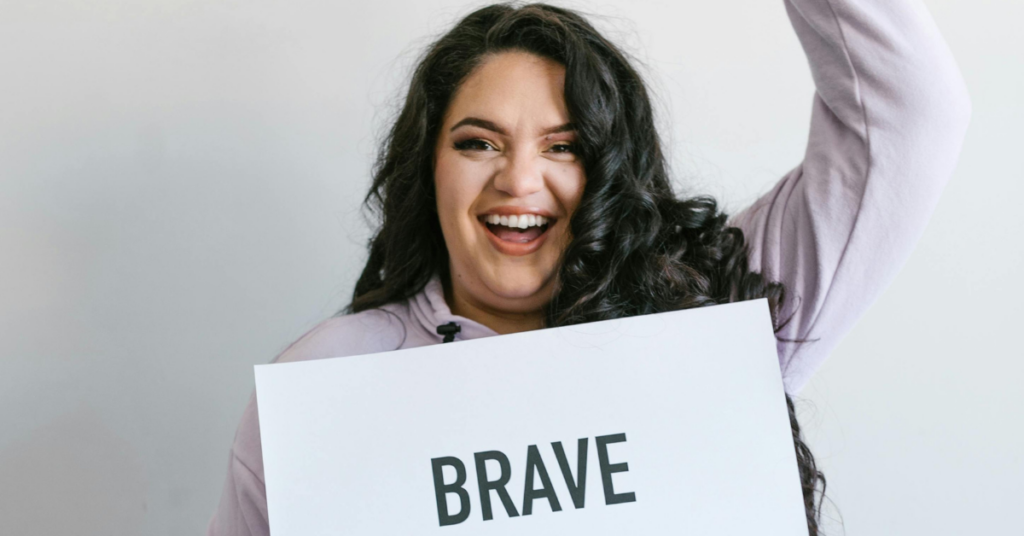Unfortunately, plus size people are still searching for ways to deal with size discrimination at work, the store, the gym, and even the doctor’s office. The conversation about anti-fatness for those outside of the “fat” community is often silenced beyond a hashtag or hot topic.
Social media comments have become discussion boards for body positivity, with virtual fist pumps and sympathy posts flooding the timelines as soft acts of allyship. However, the slightest attempt at addressing weight oppression that doesn’t fit inside the perimeters of society’s comfortability goes ignored. So, to help larger individuals combat these biases, here are a few helpful tips on managing size discrimination.

What Is Size Discrimination?
Also known as “sizism,” size discrimination is prejudice treatment of someone based on their size. While the shaming of smaller body types is very well a thing (as well as height, which also falls under the sizism umbrella), those on the bigger scale are mostly affected by the term. According to a study by SHRM, “obese employees are more likely to be perceived as lazy (27%), unmotivated (23%) and unprofessional (17%).“
NAAFA, a fat rights organization dedicated to protecting the rights and improving the quality of life for fat people, shared in their recent campaign, Campaign for Size Freedom, cofounded with Flare and supported by Dove, that “all bodies deserve care, love and respect. We want to be compensated fairly for our work, receive high-quality medical care, and be welcomed in all public spaces. For people of larger size, that is not the current reality. Very few laws exist that specifically outlaw discrimination based on body size. In 2019 alone, body size discrimination harmed 34 million Americans.”
This is a serious matter…
What Are Ways to Deal with Size Discrimination at Work?
Recognize What You’re Up Against

From stereotyping to stigmatizing, here are a few examples of what it could look like in the workplace:
- Assuming that an overweight person can’t perform tasks effectively (ie: choosing someone to do it because they’re thinner, being overlooked, nitpicky critiques)
- Unwarranted opinions on one’s appearance (ie: “I really think you should try this new diet plan!” or “Did you gain weight?”)
- Awkwardness or even judgment when requesting obesity-friendly necessities (ie: workstations, chairs)
- Division among colleagues (ie: making a difference in how they interact with the person versus others, fatphobic remarks)
- Bias rules/regulations that are only in favor of those not on the fat spectrum (ie: certain stipulations that would purposely prohibit the person from getting the position)
Talk About It

You’re in the break room, and the new hire has just said something completely out of line. Letting it slide could allow the shenanigans to continue and worsen the situation in the future. Speaking up for yourself can be done in a non-combative but firm tone.
Approaching it head-on and setting an expectation for respect is essential. Don’t be afraid to say, “Hey, Marla. I don’t appreciate how you spoke to me. I’d like us to get a clearer understanding so that it won’t transpire again,” or “James I believe that kindness should be reciprocated. For the sake of professionalism and the betterment of us both, let’s keep things cordial. Thank you.”
Stick to your standards, but always be mindful of your environment.
Educate Your Professional Circle

Poor labor conditions could weigh on your mental health. Before it gets to that point, enlighten your work crew on your feelings and why they’re valid. Calling a meeting with the staff to voice your concerns and explain what’s bothering you could make a huge impact. You don’t have to be rude or condescending — informative is key. Sometimes, hard talks are vital for progression.
Make Time to Go to HR

If nothing changes after you’ve brought your problems to the management team and your floor mates, go to the next chain of command: human resources. The cold truth is that every supervisor won’t prioritize the needs of their workers, and fellow employees won’t always care if it isn’t happening directly to them.
Keep a record of all harassment and present it to the department. Additionally, state your requirements to remain a part of the company and encourage policies. Failure to receive assurance from HR may result in having to make the tough decision to seek work elsewhere, but that’s OK.
Now, while organizations such as NAAFA are fighting for Size Discrimination and helping to champion putting these laws on the books, we still have a ways to go. Just last year, the New York City Council passed legislation to outlaw size discrimination in NYC in employment, housing, and public accommodation. Mayor Eric Adams signed the bill into law that went into effect November 26, 2023. Navigating workplace discrimination can be exhausting, especially when you’re also searching for new opportunities that offer inclusivity and support. For those seeking a fresh start in welcoming environments, exploring receptionist jobs with sponsorship options might provide both career growth and a more affirming workplace culture.
How are you navigating this issue? What are other ways to deal with size discrimination at work that have worked for you? Is this something that you have experienced or thought you had, without knowing it?
Were these tips on dealing with size discrimination at work beneficial? Let us know below!






